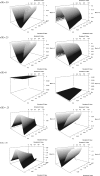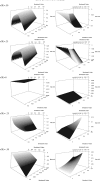Gene-Environment Interplay in Twin Models
- PMID: 24808718
- PMCID: PMC3745269
- DOI: 10.1093/pan/mpt005
Gene-Environment Interplay in Twin Models
Abstract
In this article, we respond to Shultziner's critique that argues that identical twins are more alike not because of genetic similarity, but because they select into more similar environments and respond to stimuli in comparable ways, and that these effects bias twin model estimates to such an extent that they are invalid. The essay further argues that the theory and methods that undergird twin models, as well as the empirical studies which rely upon them, are unaware of these potential biases. We correct this and other misunderstandings in the essay and find that gene-environment (GE) interplay is a well-articulated concept in behavior genetics and political science, operationalized as gene-environment correlation and gene-environment interaction. Both are incorporated into interpretations of the classical twin design (CTD) and estimated in numerous empirical studies through extensions of the CTD. We then conduct simulations to quantify the influence of GE interplay on estimates from the CTD. Due to the criticism's mischaracterization of the CTD and GE interplay, combined with the absence of any empirical evidence to counter what is presented in the extant literature and this article, we conclude that the critique does not enhance our understanding of the processes that drive political traits, genetic or otherwise.
Figures



Comment on
- doi: 10.1093/pan/mpt008
- doi: 10.1093/pan/mps035
Similar articles
-
Estimating the extent of parameter bias in the classical twin design: a comparison of parameter estimates from extended twin-family and classical twin designs.Twin Res Hum Genet. 2005 Jun;8(3):214-23. doi: 10.1375/1832427054253121. Twin Res Hum Genet. 2005. PMID: 15989749
-
The Augmented Classical Twin Design: Incorporating Genome-Wide Identity by Descent Sharing Into Twin Studies in Order to Model Violations of the Equal Environments Assumption.Behav Genet. 2021 May;51(3):223-236. doi: 10.1007/s10519-021-10044-0. Epub 2021 Feb 13. Behav Genet. 2021. PMID: 33582897
-
The Impact of Variation in Twin Relatedness on Estimates of Heritability and Environmental Influences.Behav Genet. 2018 Jan;48(1):44-54. doi: 10.1007/s10519-017-9875-x. Epub 2017 Nov 2. Behav Genet. 2018. PMID: 29098497
-
Are there genetic influences on addiction: evidence from family, adoption and twin studies.Addiction. 2008 Jul;103(7):1069-81. doi: 10.1111/j.1360-0443.2008.02213.x. Epub 2008 May 20. Addiction. 2008. PMID: 18494843 Review.
-
The equal environments assumption of classical twin studies may not hold.Br J Educ Psychol. 2005 Sep;75(Pt 3):339-50. doi: 10.1348/000709904X24690. Br J Educ Psychol. 2005. PMID: 16238870 Review.
Cited by
-
Delayed tracking and inequality of opportunity: Gene-environment interactions in educational attainment.NPJ Sci Learn. 2022 May 4;7(1):6. doi: 10.1038/s41539-022-00122-1. NPJ Sci Learn. 2022. PMID: 35508471 Free PMC article.
-
Do Children Cause the Cognitive Stimulation they Receive? Modelling the Direction of Causality.Behav Genet. 2024 Nov;54(6):443-455. doi: 10.1007/s10519-024-10195-w. Epub 2024 Sep 10. Behav Genet. 2024. PMID: 39251457 Free PMC article.
-
Genetic variation in health insurance coverage.Int J Health Econ Manag. 2019 Dec;19(3-4):301-316. doi: 10.1007/s10754-018-9255-y. Epub 2018 Nov 12. Int J Health Econ Manag. 2019. PMID: 30421388
-
Pattern Similarity Analyses of FrontoParietal Task Coding: Individual Variation and Genetic Influences.Cereb Cortex. 2020 May 14;30(5):3167-3183. doi: 10.1093/cercor/bhz301. Cereb Cortex. 2020. PMID: 32086524 Free PMC article.
-
A Chip Off the Old Block: Parents' Subtle Ethnic Prejudice Predicts Children's Implicit Prejudice.Front Psychol. 2018 Feb 9;9:110. doi: 10.3389/fpsyg.2018.00110. eCollection 2018. Front Psychol. 2018. PMID: 29479328 Free PMC article.
References
-
- Alford J R, Funk C, Hibbing J R. Are political orientations genetically transmitted? American Political Science Review. 2005;99(2):153–67.
-
- Alford John R, Hatemi Peter K, Hibbing John R, Martin Nicholas G, Eaves Lindon J. The politics of mate choice. Journal of Politics. 2011;73(2):362–79.
-
- Baron R M, Kenny D A. The moderator-mediator variable distinction in social psychological research: Conceptual, strategic, and statistical considerations. Journal of Personality and Social Psychology. 1986;51(6):1173–82. - PubMed
-
- Boardman Jason D. Man Is by Nature a Political Animal. 2011. Is gene-environment interplay relevant to the study of political behaviors and attitudes? eds. Peter K. Hatemi and Rose McDermott. Chicago: University of Chicago Press.
LinkOut - more resources
Full Text Sources
Other Literature Sources
